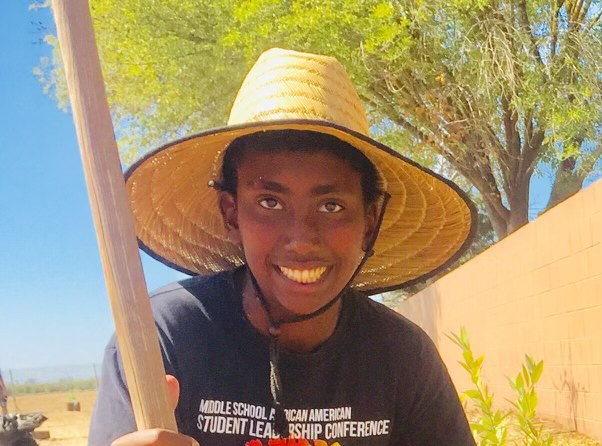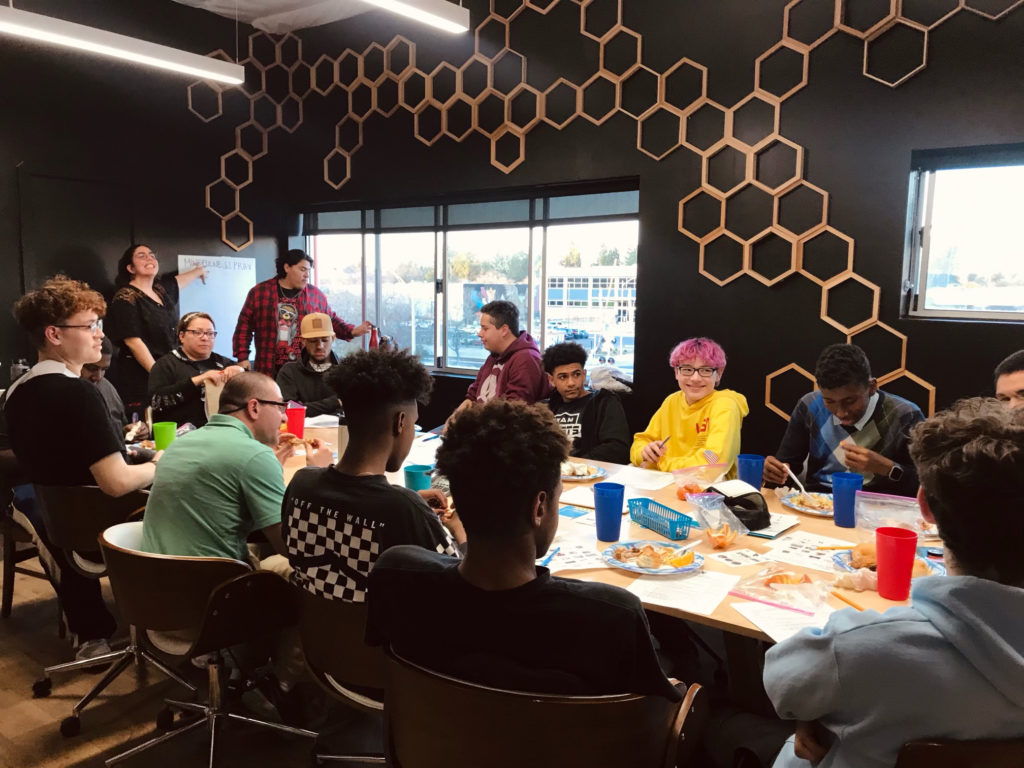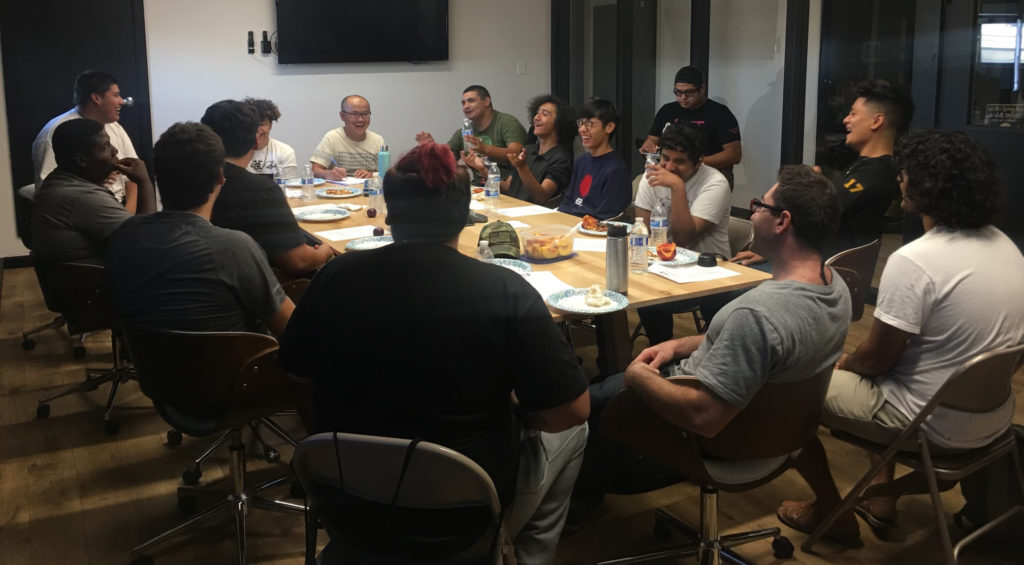A core belief of Youth Leadership Institute is that there can only be true justice and community change if those most affected are a part of decision-making. Young people must have a place “at the table” in order to make our communities places where everyone has the opportunity to thrive. It is yli’s job to run programs and trainings to make sure that young people are included at the table as often as possible so that youth voice will shape the future we are building together.
Read Yosef Aklilu’s story below, and consider investing in youth at the table this holiday season. Click here to contribute!

I’ve always had this image of youth participation as being like a consultant: a federal government meeting, for example, where the president’s and his cabinet’s assistants are standing by, but not actually sitting at the table with the president. And that’s how most of my experiences with youth clubs have been. Throughout middle school and freshman year, I was involved in academic and leadership clubs, and it was always the same: adults leading and youth just following instructions, like in school, doing the required homework.
Eighth grade Leadership class was a huge step forward from this situation. Then I joined Boys & Men of Color (BMoC) in 2019 at a Club Rush event at my high school – and “youth at the table” describes exactly my first impression. My first general meeting was in November at the BitWise office in Fresno. It’s such a nice office! I always used to see it when my dad and I drove by on the freeway – it looks like a multi-colored beehive. I went with some friends, and I was ready for a new experience.
As a new member, I thought Kato and Sher – our adult allies – were going to tell me what to do. But it wasn’t at all like those other clubs. Literally, we all sat down at the same table. They gave us food, and we started collaborating on ideas for a mental health project. All of our ideas were welcome, good or terrible, as many ideas as we wanted. Once at a virtual meeting, we were asked what “mental health” actually means to us, and how we would describe it to someone who had never heard of it before. One of the youth actually called his grandma while we were in the meeting to try out his definition!
Adults brought ideas, too – really good ideas – but it always felt like youth could be right alongside, giving input, working on the project together. That was the feeling of all the meetings: eating, socializing and also getting down to work.

In late May of 2020, our adult allies brought us a big idea: to submit a proposal to Fresno City Council for a mental health project. BMoC partners a lot with the Fresno Youth Commission, which is also run by yli. They have more direct communication with the Fresno City Council and had heard that the CARES Act had still had millions left over for COVID-related projects. With the pandemic, the City had to acknowledge that mental health is more important than ever because of the additional stress of finances and health. The Commission suggested we bring a proposal to the table about how to use the money.
If we were going to do it, though, we had to take it seriously. We only had one month to finalize a plan in time for the last budget hearing at the end of June. So we decided to move forward with a two-part proposal for $525,000. One part of the funding would go toward local mental health organizations. The other part would go toward paid youth internships at these organizations.
We began having weekly meetings, researching and reaching out to mental health organizations from each district in Fresno, focusing on those communities that have been especially impacted by COVID. We scripted out our questions, and spoke with the Executive Directors to see if their organizations were the right fit for our project. We met with City Council member Esmeralda Soria to get her ideas and feedback, and our adult allies worked on calculations for the proposal’s budget.
I remember the day it was accepted: July 1st. I felt super happy, super proud of everyone in the group. José Espinoza from the Fresno Youth Commission said he never saw a proposal done so fast. There had been so many great ideas, and we’d had to compromise and work really hard to come up with the final proposal. To this day, I feel like this is one of my greatest life accomplishments.
For me, it was a big experience because it changed my understanding of politics. I have always been interested in national politics, but this experience brought me back to my roots. I learned who my council members are, what district I live in, and what district my school is in. I also learned that I can have much greater impact at the local level. A lot of mental health organizations have been financially impacted by the pandemic and were closing. Our proposal will help to keep the doors open and even expand services to youth in Fresno to get resources they need.
I wish other young people could have the feeling I had – like I can do the same thing that any adult can do in terms of decision-making, advocacy, and social justice. I’ve always been told by adults that I can have a say in what happens, that I can have an impact, but it’s never felt real. A lot of adults want youth to be involved, but don’t trust us enough to give us a real seat at the table, to bring our ideas or make decisions.
Adults might not intend to make youth feel like they can’t do it. But, that’s usually what comes across. I remember going to a school board meeting once. It was so formal, at this fancy downtown spot, and there were barely any youth – just me and 3 other members. There was a huge TV screen with our faces on it where we introduced ourselves, and then the adults went on to have a 2-3 hour meeting that didn’t involve us. It just felt boring.
Because of that, a lot of youth don’t know what they’re capable of. We don’t know how to start or what resources are available to us. We feel intimidated by adults and vulnerable about speaking up and saying what’s on our minds. This is unfortunate because we have so many great ideas and perspectives on issues – perspectives that adults might not have. I always hear adults saying, “When I was your age…” but adults are not at our age right now and haven’t been through some of the situations we’re facing now. So it makes sense that we’ll have better solutions. Youth are also so creative! We’re so open to trying new things – clubs, classes, sports – we want to try everything out. We get excited by new ideas – we’re not so focused on one narrow career path.
I think the first step to bringing youth to the table is being open to youth ideas. They should feel like they can bring whatever ideas, thoughts, perspectives, and experiences they have without judgement. BMoC holds healing circles and they’re very confidential. Youth feel like they can be open, express themselves, be vulnerable, and it stays in that room. I think youth need to feel comfortable in order to be able to reach their full potential.

I also think adults need to understand youth development – that not all youth are maturing at the same pace. There needs to be equity in the opportunities offered to each student, which means finding ways to meet different students’ needs. They need to acknowledge that youth are growing, especially in high school. This is a big transition – we have more responsibilities, and we’re not the same childish people we once were. Space needs to be made for youth ideas, not just in clubs, but in families, and at school.
Emotions are running high right now, and I’m really glad to see the huge growth of youth involvement. This whole year has been a catastrophe, with racial inequality, police brutality, wildfires, financial issues, COVID. The pandemic has hit young people more directly, in a way we hadn’t expected. But youth have turned it into a positive for themselves. There’s a growing willingness to learn and become more involved in politics. Youth are getting educated via technology and social media, and finding new ways to be active and involved. For example, a friend of mine is starting a club to take action – to actually walk the walk – from reposting small Instagram stories about politics and human rights to direct action, with a much larger impact. This has been a good time for me to set my values and morals and think about what I want to do – how I can possibly make social justice a career.
Ultimately, I’d like to see more youth representation in social justice organizations. I joined Gen Up, which is run by youth, and I’d love to see more youth join because the work was so influential. Showcasing and broadcasting our accomplishments would help youth to know what they are capable of. I want other youth to know that they can do what I have done.
